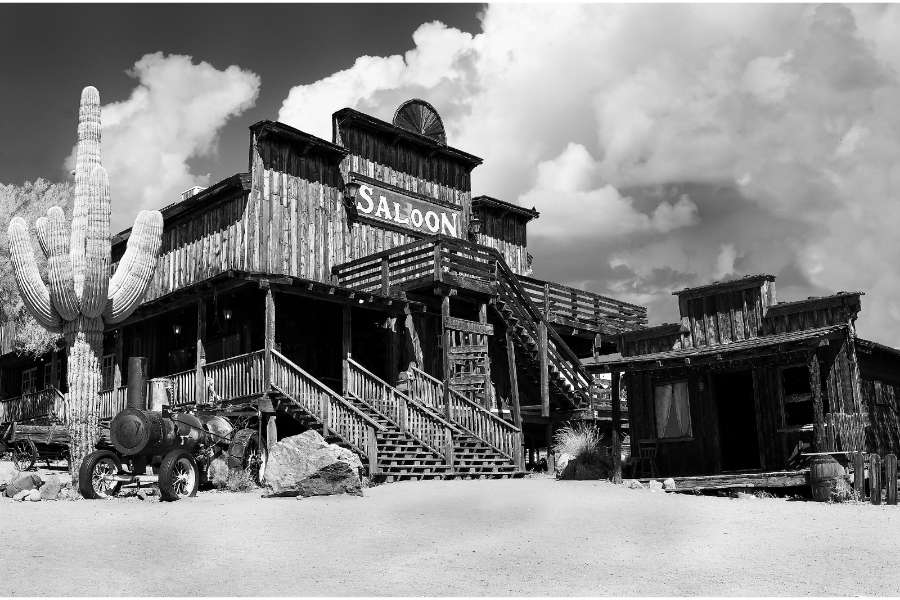During the exploration of the wild west gambling, including card games, was very popular. Professional gamblers were both men and women, belonged to different nationalities and social groups.
But they all enjoyed unwavering respect in their midst. And only decades later, when these formerly wildlands were gradually developed, the attitude towards gambling changed for the worse. At the same time, the first attempts were made to limit or prohibit them.
Wild west gambling history
California gold prospectors were addicted to gambling, and enterprising people made money from their hobby. So gambling houses appeared, offering not only tables for games, but also music and sex services.
With the further growth of the gold rush, New Orleans picked up the baton, becoming the new capital of the gambling business. In the second half of the 19th century, the number of gambling salons there was in the hundreds. In today’s world, these saloons have replaced sites where you can gamble just as you did 200 years ago. Instant casino is one of the prime examples of such a site, where you can play slot machines online, roulette or poker without downloading special software.
Gradually, the games began to attract not only whites but also colored Americans. There was an opportunity to play for women as well. The rules were born to standardize card games. In particular, it was forbidden to view the card discard. The entire pot was taken from the player who broke the rules. With the further spread of gambling, the activities of gambling houses were subject to the law, and taxes began to be levied on them.
In the end, lawmakers went even further, gradually pushing for bans on a number of old west card games, as well as restrictions on the gambling business. This trend led to the demise of the gambling industry. But the memory of old entertainments and the best gamblers of that time remains.
Faro
This is a gambling entertainment that originates from an old game called Basset. The homeland of Faro was France in the second half of the 17th century. At first, it was called Pharaoh. Several decades later, it was played all over Europe. In America, the name of this game was simplified to Faro, and it became common among Californian gold diggers.
The reason for the popularity of Faro can be called the ease of development and the short period of time required for this game. From the early 19th century to the early 20th century, this game was offered by all the wild west casinos. In terms of rules, this is mini-baccarat. Basic rules of the Faro card game:
- There is only one deck in Faro, while the number of participants in the game is arbitrary.
- Cards of all denominations, but of the same suit (as a rule, spades) were laid out on the board with the backside up.
- Each player bet on any of the thirteen cards. It was possible to bet both on one card and on several cards.
- The “highest card” was placed at the top of the spread. After it was opened, a “bank card” was placed to the right of the dealer, and after that, to the left, a “gambler’s card”, which was sometimes called “English”, was laid out.
- The dealer won everything that was put on the “bank card”.
- The one who successfully bet on the “English card” won the double bet.
- When the pair was dealt, the dealer won half of the bets on the card.
- If they played fair, this was the only advantage of the gambling establishment. In addition, there was the possibility of betting on the “high card” at the top of the board. They bet that the “English card” will be higher than the bank.
Faro became popular in the Wild West thanks in large part to the likes of John Henry Holliday (Doc Holliday) and Jefferson Randolph Smith.
John Henry Halliday
Wild west gambler Doc Holliday was born in 1851. Thanks to his intelligence, he and perfectly mastered cards. They became a means of enrichment for him. He became a professional poker player and a dealer in Faro. Such a career required well-developed self-defense skills. Therefore, Doc perfectly mastered not only cards but also techniques for handling a knife and a revolver.
During a short but stormy life, he had to participate in numerous fights and several gang gunfights. After several kills, Holliday was needed to hide from the police. He eventually arrived in Denver, where he made a living as a Faro dealer under an assumed name. In 1887, Doc died of tuberculosis. They say that before he died, he was very surprised that he was dying not from a bullet, but from an illness in his own bed.
Jefferson Randolph Smith
Jefferson “Soapy” Randolph Smith was born in 1860 in Newnan, Georgia. Unlike Doc Holliday, he rarely worked alone. Criminal groups organized by him throughout America engaged in gambling fraud, including cards. He got his nickname “Soap Smith” because of fraudulent actions in the sale of soap, which brought him a solid profit. Jefferson Randolph Smith died a violent death in 1898 in Alaska.
Three card Monte
This card game, known since the 15th century, may also be called “The Quest for the Lady” or simply “Three-card trick”. Unlike Faro, which has sometimes been played fairly, Monte is pure fraud. We can say that this is not even a game, but a card trick used to deceive gullible gamblers.
The essence of the fraud is that the victim of the cheating bets on one of the three cards lying with the backside up, hoping that he will guess it correctly. But the dealer’s dexterous hands deprive such a player of even the slightest opportunity to win. Winning in Monte was exclusively the sharpshooters.
The trick is based on fast movement of cards, which not only confuses the player but also gives the dealer the opportunity to cheat. The player is attracted by the promise that he will win double the amount of the bet if he guesses the card correctly. But he has no chance of that. Among the most famous cheaters who played at Monte was William Jones.
William Jones
Bill Jones, nicknamed “Canadian”, was actually born in 1837 in England. He later lived in Canada and the US, where he became rich through card fraud. Monte’s game became the basis of his income. Jones first operated in gambling saloons and made $ 200,000 in Kansas City alone.
For a long time, the Canadian and his partner played on Union Pacific Railroad trains, until the company staff began to chase them. It got to the point where Jones was offering the company’s management from $ 10,000 to $ 30,000 annually for the right to play Monte on its trains. However, he was refused. The Canadian died in 1877 from tuberculosis.
Poker
The poker fashion came to the US in the first half of the XIX century. This gambling entertainment has become as popular in this country as cowboys, vans, gold diggers and Colts. Particularly enterprising people made a lot of money on this game.
Poker first appeared in New Orleans. Originally a poker deck counted 20 cards, each hand had 5 of them. For decades, poker was the main means of passing the time during traveling along the great rivers of North America. The new peak in popularity of poker fell on the “gold rush” in the state of California.
1948 was the time of the emergence of poker, whose deck of cards consisted of 52 cards. The rules also were changed: the combination “flush” and the draw concept were added. After the Civil War, the combination of “straight” was added to poker. The first wild cards appeared around 1875. The legendary professional poker gambler of the time was James Butler Hickok (Wild Bill).
James Butler Hickok
This legendary old west gambler has earned not only a reputation as a great shooter but also as one of successful professional poker players. However, he had many activities. Hickok became known as a bandit, warrior, police officer, spy, lawyer, gambler and master of performing arts.
Even the modest profession of stagecoach coach, which he also managed to master, in those turbulent times demanded a fair amount of courage and a desire for adventure. This man became the true embodiment of the Wild West, although in his life story it is often difficult to differentiate truth from tales.
Hickok was born in 1837 in Homer town (today it’s Troy Grove in Illinois). Attracted by the criminal lifestyle of the Prairie Conquerors, he set out for the Wild West at the age of eighteen. He took an active part in the Civil War, and in peacetime, he managed to start at least a few shootings. Throughout his life, he often spent time in saloons, where he played mainly poker. As a professional at the cards, he turned gambling into a source of constant income.
In 1876, Hickok died from a bullet he received in Deadwood. It took place in a saloon while playing poker with the man who lost to him. The combination of cards that Hickok held just before death was named “the hand of the dead.”
Conclusion
The golden age of gambling ended in the States with a suffrage reform that gave women the right to vote and power. A big number of laws are associated with this era that prohibited the sale of alcohol and card gambling. The ban affected most of the American states, which led to the decline of professional gambling. Only in the middle of the last century the card game for money legalized again. But the memory of the great gamblers of the Wild American West never faded.















